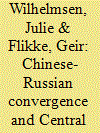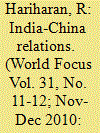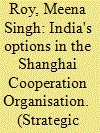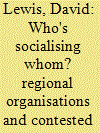| Srl | Item |
| 1 |
ID:
108909


|
|
|
|
|
| Publication |
2011.
|
| Summary/Abstract |
Since the mid-1990s, China's and Russia's strategic outlooks have gradually been converging. The two great powers have incrementally shed their mutual apprehensions and started a comprehensive and multifaceted cooperation in the Shanghai Cooperation Organisation (SCO). Simultaneously, as the rift between the US and Russia has opened up and the differences in their views on regional security in Eurasia have become even more evident, China's and Russia's quests for new models for regional security in Central Asia have gained ground. Enveloping the Central Asian states on issues of collective and energy security, both states are sternly against US dominance in international affairs. In this sense, they have initiated a new geopolitical script around Central Asia. As their mutual interests hold sway over US influence regionally, questions remain on whether specific interests are compatible, or harbour new rivalries. Chinese-Russian interaction in Central Asia reveals that there might be limits to the future expansion of their partnership.
|
|
|
|
|
|
|
|
|
|
|
|
|
|
|
|
| 2 |
ID:
100371


|
|
|
| 3 |
ID:
114347


|
|
|
|
|
| Publication |
2012.
|
| Summary/Abstract |
In June 2011, the Shanghai Cooperation Organisation (SCO), an influential Eurasian regional grouping consisting of Russia, China and four Central Asian Republics (CARs)-Uzbekistan, Kazakhstan, Tajikistan and Kyrgyzstan-formally approved a 'memorandum of obligation', which will now enable non-member countries to apply for SCO membership. India is an observer in the SCO and has expressed its desire to play a larger and more meaningful role as a full member of the organisation. Russia and the Central Asian states have always been very supportive of India's entry into the SCO as a full member but it was only recently that New Delhi expressed its desire to join the organisation as such.
On 17 August 2011, India's foreign minister said: 'India's entry into SCO will not only add value but also enhance stature of the organisation… . This is an important grouping'. 1 He also informed the Rajya Sabha ('House of the States', the Upper House of India's parliament) during Question Hour 2 that he was in touch with his counterparts in the SCO member countries regarding India's case for full membership and had received positive responses from them. In this context, some key issues related to India's full membership and its options of engagement with the SCO require a comprehensive analysis. It is important to examine the implications of full membership for India in the context of the new rules approved in the last SCO summit meeting in Astana and to explore whether there is a case for India to join the SCO as a full member. What will India gain as a full member? What are its options in the SCO? And finally, what challenges may it face as a full member? Such an analysis would help India in developing a mid- and long-term strategy for effective engagement with the SCO.
|
|
|
|
|
|
|
|
|
|
|
|
|
|
|
|
| 4 |
ID:
114744


|
|
|
|
|
| Publication |
2012.
|
| Summary/Abstract |
The proclaimed function of the Shanghai Cooperation Organisation (SCO) is regional security management. Nonetheless, it has never conducted a conventional peacekeeping operation, in spite of incidents of mass violence and instability within its region. This is in large part because regional elites consider state/regime security as paramount and that the SCO's central principle of non-interference takes precedence over intervention on humanitarian grounds. This article investigates the debate within the SCO about the relative salience of non-interference against the need for peacekeeping operations, examining the case of its non-action during the Osh Riots 2010. It concludes that considerations of political reassurance and inter-regime mistrust at a regional level and serious practical limitations in capacity dissuaded the most prominent member states from acting, via the SCO, Collective Security Treaty Organisation or independently, in what was perceived as an internal Kyrgyz affair because it did not directly threaten the security of the other members' regimes.
|
|
|
|
|
|
|
|
|
|
|
|
|
|
|
|
| 5 |
ID:
114454


|
|
|
|
|
| Publication |
2012.
|
| Summary/Abstract |
The Organization for Security and Cooperation in Europe (OSCE) and the Shanghai Cooperation Organisation (SCO) represent competing sets of international norms in Central Asia. The contestation between these sets of norms has not led to a complete polarisation between members of the two organisations, however. Instead, the OSCE has used a range of discursive tactics to reduce political contestation, downplaying some contested issues and seeking shared discourses on security threats. This article explores these tactics and suggests that these discursive shifts may eventually threaten the normative identity of the OSCE and lead to the acceptance of a more hybrid set of security-related norms in the region.
|
|
|
|
|
|
|
|
|
|
|
|
|
|
|
|